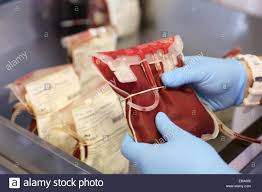 A place where blood collected from donors, typed, separated into components, stored, and prepared for transfusion to recipients. A Blood Bank may be a separate freestanding facility or part of a larger laboratory in a hospital. Separation of blood: Typically, each donated unit of blood (whole blood) separated into multiple components, such as red blood cells, plasma and platelets. Each component generally transfused to a different individual, each with different needs. An increasingly common Blood Bank procedure is apheresis, or the process of removing a specific component of the blood, such as platelets, and returning the remaining components, such as red blood cells and plasma, to the donor. This process allows more of one particular part of the blood be collected than could be separated from a unit of whole blood. Apheresis also performed to collect plasma (the liquid part of the blood) and granulocytes (white blood cells) Quality in transfusion practice must apply to the hospital Blood Bank or equivalent, because it plays a vital role in ensuring that the correct blood component supplied for the patient. The laboratory aspect of the transfusion process carried out in different ways across the countries of the EU. In some settings, a local hospital Blood Bank manages the blood component inventory and the clinical blood transfusion laboratory services. Elsewhere, the blood establishment provides compatible blood directly to hospitals.EU Directives require that hospital Blood Banks implement a quality management system. To maintain a high level of performance in the laboratory, it is essential to monitor the functioning of reagents, equipment, techniques and procedures. Good record keeping and documentation, use of standard operating procedures and laboratory worksheets, and implementation of safety guidelines further improve the quality of performance.
A place where blood collected from donors, typed, separated into components, stored, and prepared for transfusion to recipients. A Blood Bank may be a separate freestanding facility or part of a larger laboratory in a hospital. Separation of blood: Typically, each donated unit of blood (whole blood) separated into multiple components, such as red blood cells, plasma and platelets. Each component generally transfused to a different individual, each with different needs. An increasingly common Blood Bank procedure is apheresis, or the process of removing a specific component of the blood, such as platelets, and returning the remaining components, such as red blood cells and plasma, to the donor. This process allows more of one particular part of the blood be collected than could be separated from a unit of whole blood. Apheresis also performed to collect plasma (the liquid part of the blood) and granulocytes (white blood cells) Quality in transfusion practice must apply to the hospital Blood Bank or equivalent, because it plays a vital role in ensuring that the correct blood component supplied for the patient. The laboratory aspect of the transfusion process carried out in different ways across the countries of the EU. In some settings, a local hospital Blood Bank manages the blood component inventory and the clinical blood transfusion laboratory services. Elsewhere, the blood establishment provides compatible blood directly to hospitals.EU Directives require that hospital Blood Banks implement a quality management system. To maintain a high level of performance in the laboratory, it is essential to monitor the functioning of reagents, equipment, techniques and procedures. Good record keeping and documentation, use of standard operating procedures and laboratory worksheets, and implementation of safety guidelines further improve the quality of performance.
Responsibilities
Enlisted Below are the main points:
- Rapid response to urgent requests for blood components
- Checking pre-transfusion samples and requests
- Assessing of immunological compatibility between donor and patient
- Selecting of suitable blood component for each clinical condition
- Safe delivery and handling of blood components
- Inventory and stock management
- Interactions with the blood establishment
THQ Hospital Blood Bank runs transfusion service 24/7 in order to facilitate patients pertaining to their treatments, surgeries & other related illness requirements. This service as the backbone of the hospital catering to the emergencies, trauma cases, viral endemics and support to Dialysis Centre. Punjab Blood Transfusion Authority licenses Blood Bank THQ Hospital. A Blood Transfusion Committee over seas the blood transfusions and issues relating to Blood Banking.
Facilities
Enlisted Below are the main points:
- Whole Blood
- Storage of Blood Donor Motivation and Donor Counselling
- Donor Recruitment -Voluntary and Replacement
- Donor Blood Collection – In-house and Mobile Camps
- Blood Group Serology-ABO/RH for Patient/Donor
- Pre Transfusion Testing
- Compatibility testing ABO/RH Semi and fully Automated
- Antibody screening and Identification.
- Antibody screening Diagnostic
